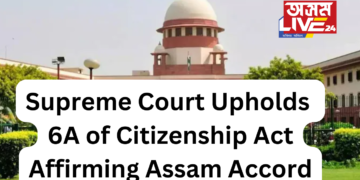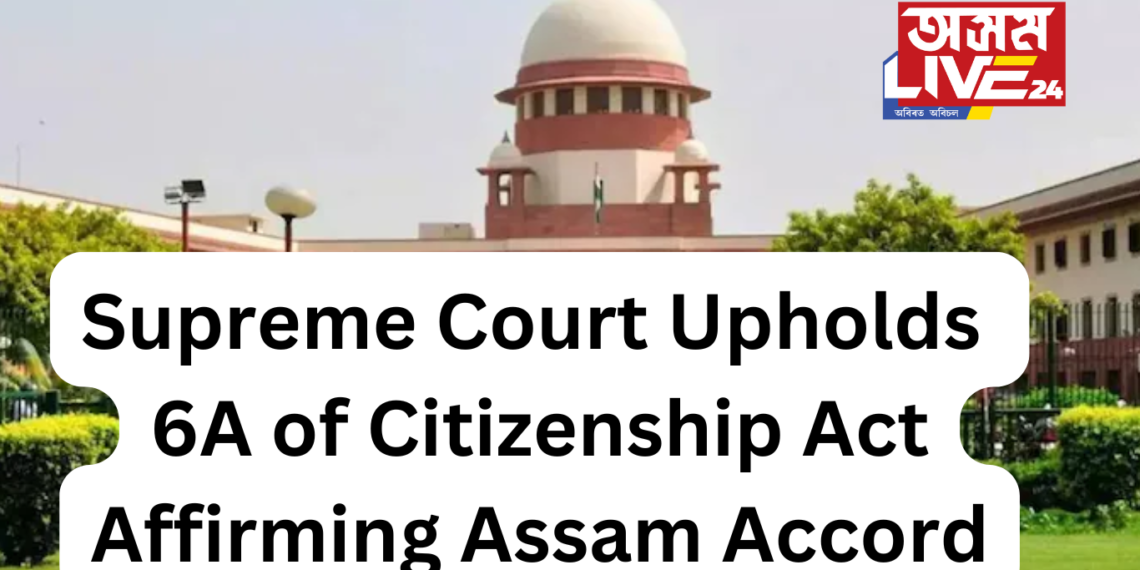In a significant ruling on Thursday, the Supreme Court upheld the constitutionality of Section 6A of the Citizenship Act of 1955, reinforcing the Assam Accord. The decision came from a five-judge Constitution Bench, led by Chief Justice DY Chandrachud, with Justices Surya Kant, MM Sundresh, JB Pardiwala, and Manoj Misra. Notably, Justice Pardiwala dissented, arguing that Section 6A is unconstitutional.
CJI Chandrachud explained that the Assam Accord provides a political resolution to the challenges posed by illegal migration, with Section 6A representing a legislative measure to address these concerns. The majority opinion stressed that Parliament has the authority to enact this provision, which aims to balance humanitarian needs with the necessity of safeguarding local interests.
The bench further noted that Assam’s unique demographic situation justifies special treatment, as the proportion of immigrants to the local population is significantly higher than in other border states. They cited evidence indicating that the presence of 40 lakh migrants in Assam has a more pronounced impact compared to 57 lakh migrants in West Bengal, given Assam’s smaller land area.
The Court also validated March 25, 1971, as a legitimate cut-off date for citizenship claims, marking the end of the Bangladesh liberation war. The majority asserted that Section 6A is “neither over-inclusive nor under-inclusive,” reinforcing its constitutionality.
CJI Chandrachud emphasized that the coexistence of various ethnic groups within a state does not violate the fundamental right to preserve linguistic and cultural heritage, as outlined in Article 29(1) of the Constitution. He clarified that petitioners must demonstrate that one ethnic group cannot protect its language and culture solely due to the presence of another group.
Justice Surya Kant rejected claims that Section 6A contravenes the fraternity principle in the Constitution’s Preamble, asserting that fraternity should not be narrowly interpreted to allow individuals to choose their neighbors.
The Court has instructed the Ministry of Home Affairs to provide data on the influx of illegal migrants to Assam and other Northeastern states post-March 25, 1971, including statistics on citizenship grants and Foreigners Tribunals’ activities.
What is Section 6A of the Citizenship Act?
Section 6A allows foreign migrants of Indian origin who entered Assam between January 1, 1966, and March 25, 1971, to apply for Indian citizenship. This provision was introduced in 1985 to address the concerns of leaders involved in the Assam movement against illegal migration from Bangladesh.
Opposition and Key Arguments
Opposition to Section 6A has emerged from various indigenous groups in Assam, who argue that it legitimizes the illegal entry of Bangladeshi migrants. Critics contend that the provision violates foundational constitutional principles, including fraternity, citizenship, unity, and integrity, as well as fundamental rights under Articles 14, 21, and 29. They argue it undermines political rights and exceeds legislative competence, challenging the principles of democracy, federalism, and the rule of law.
The Assam Sanmilita Mahasangha, a civil society organization, first challenged Section 6A in 2012, claiming its discriminatory nature. A two-judge bench referred the case to a Constitution Bench in 2014, leading to several reconstitutions before reaching the current composition. Hearings began on December 5 and concluded on December 12, 2023, with the judgment reserved until now.
এনেধৰণৰ অন্যান্য বা-বাতৰিৰ বাবে লাইক কৰক অসম লাইভ ২৪ ৰ ফেচবুক পেজ






















